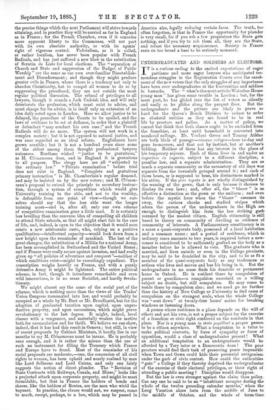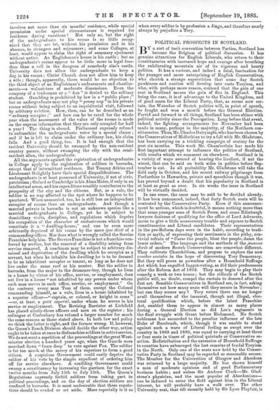UNDERGRADUATES AND SOLDIERS AS ELECTORS.
IT is a curious ending to the excited expectations of eager partisans and more eager lawyers who anticipated tre- mendous struggles in the Registration Courts over the enrol- ment of the new voters that the only struggles of any importance have been over undergraduates at the Universities and soldiers in barracks. The " what's-the-next-article-Waterloo-House young man" has given some trouble in London ; but, for the most part, he has glided into the list of voters as silently and easily as he glides along the parquet floor. But the undergraduate and the private are likely to prove as hard for the Queen's Bench Division to reduce to order as electoral entities as they are found to be in real life by proctors and police. As a matter of policy, we cannot but think that both classes ought to be excluded from the franchise, at least until household is converted into manhood suffrage. Mr. Verdant Green and Tommy Atkins are both birds of passage—oiseaux volages—here to-day and gone to-morrow, and that not by instinct, but at another's bidding. Neither of them has any interest in the place of his temporary sojourn. Each of them lives in and under an imperiurn in imperio, subject to a different discipline, a peculiar law, and a separate administration. They are as much a separate community as the monastery of old days was separate from the townsfolk grouped around it ; and each of them bears, or is supposed to bear, his distinctness marked in his attire, If the gen$ togata is not wholly distinguished by the wearing of the gown, that is only because it chooses to disobey its own laws ; and, after all, the " blazer " is as effective a distinction as the gown or the uniform ; and even before the mystic hour when the " blazer " assumes its sway, the curious checks and studied stripes which adorn the person of the undergraduate in the High are enough to distinguish hhn from the less striking garb assumed by the modest citizen. English citizenship is still based in theory on community of dwelling as evidence of community of interests. A Parliamentary constituency is in a sense a quasi-corporate body, possessed of a local habitation and a common name ; and a period of residence, which in ordinary cases amounts to two years, is required before a new- comer is considered to be sufficiently grafted on the body as a member before he is allowed to vote. The graduate who is married, and lives outside or even in the College precincts, may be said to be domiciled in the city, and to be as fit a member of the quasi-corporate body as any tradesman or artisan who lives and moves and has his being in it. But the undergraduate in no sense finds his domicile or permanent home in Oxford. He is resident there by compulsion of parent or guardian,a compulsion exercised on a willing subject no doubt, but still compulsion. He may cease to reside there by compulsion also ; and we need go no further than the history of New College or Pniversity to find cases of compulsion on the strongest scale, when the whole College was "sent down" at twenty-four hours' notice for breaking windows or fastening doors. A person whose residence in a place depends on the will of others and not his own, is not a proper subject for the exercise of a franchise or civic right conferred on the residents in that place. Nor is a young man ia statu pupillari a proper person to be a citizen anywhere. What a temptation to a tutor to make political converts, by force of sympathy or force of opposition, would a class of undergraduates present ! What an additional temptation to an undergraduate would be afforded by a Tory tutor or a Democratic dean The poor proctors would find their task of preserving peace impossible when Town and Gown could hide their perennial antagonism under the garb of civic contest. How could the authorities " gate " a College if they thereby deprived the undergraduates of the exercise of their electoral privileges, or their right of attending a public meeting ? Discipline would disappear.
But the law is even stronger against the claim than policy. Can any one be said to be an "inhabitant occupier during the whole of the twelve preceding calendar months," when the Long Vacation alone lasts from the middle of June to the middle of October, and the whole of term-time involves not more than six months' residence, while special permission under special circumstanees is required for residence during vacations ? Not only so, but the right of the undergraduate to his rooms is so little recog- nised that they are let, without his permission and in his absence, to strangers and sojourners ; and some Colleges, at least, would appear to claim the right of summary ejectment • without notice. An Englishman's house is his castle ; but an undergraduate's rooms appear to be little more in legal free- dom than a cell in the dungeon of somebody else's castle. University does not allow the undergraduate to keep a
dog in his rooms ; Christ Church does not allow him to keep a wife ; though, apparently, there would be no objection to
the third object of an Englishman's endearments and chastise- ments—a walnut-tree of moderate dimensions. Even the company of a tradesman or a " dun " is denied to the solitary student. Gambling is prohibited by law in a "public place ;" but an undergraduate may not play "penny nap " in his private rooms without being subject to an inquisitorial visit, followed by arbitrary eviction. How, then, can he be described as an "ordinary occupier ;" and how can he be rated for the whole year when the assessment of the value of the rooms is made on the express information that they are only occupied for half a year The thing is absurd. Parliament expressly refused to enfranchise the undergraduate voter by a special clause ; and if he is left to claim under the ordinary law, his claim fails. And a good thing, too. It is bad enough that the resident University should be swamped by the non-resident country parson, without swamping the city with the semi- resident alien, the undergraduate.
All the arguments against the registration of undergraduates in College apply to the registration of soldiers in barracks, except that of intermittent residence. But Tommy Atkins and Lieutenant Golightly have their special disqualifications. The undergraduate is at least possessed of University, if not of civic, patriotism ; Oxford or Cambridge is his Alma Mater, if only in an intellectual sense, and his expenditure sensibly contributes to the prosperity of the city and the citizens. But, as a rule, the soldier is no way affected to the spot where he happens to be quartered. When unmarried, too, he is still less an independent occupier of rooms than an undergraduate. And though a married private in barracks is not an unknown species like a married undergraduate in College, yet he is subject to domiciliary visits, discipline, and regulations which deprive his occupation of the character of exclusiveness which would constitute it a "dwelling-house," and can be even more arbitrarily deprived of his rooms by the mere ipse dixit of a commanding officer. Nor does what is wrongly called the Service Franchise helphim. The Service Franchise is not a franchise con- ferred by service, but the removal of a disability arising from service removed. A coachman may be subject to arbitrary dis- missal and deprivation of the dwelling which he occupies as a servant, but when he inhabits his dwelling he is to be deemed to be an inhabitant occupier or tenant, so long as he does not live under the same roof as his master. But the soldier in barracks, from the major to the drummer-boy, though he lives in a house by virtue of his office, service, or employment, does not live in a house "not inhabited by any person under whom such man serves in such office, service, or employment." On the contrary, every man Tom of them, except the Colonel commanding himself, as a rule, lives in a house inhabited by a superior officer—" captain, or colonel, or knight in arms" —or, at least, a petit caporal, under whom he serves in his service or employment. The Revising Barrister at Lichfield has placed ninety-three officers and men on the register ; his colleague at Canterbury has refused a larger number for much the same reasons as those stated above. In both law and policy we think the latter is right, and the former wrong. If, however, the Queen's Bench Division should decide the other way, action ought to be taken at once to disfranchise soldiers in active service. We do not want a repetition of the proceedings at the great West- minster election a hundred years ago, when the Guards were marched down "fours deep" to vote against Fox. The soldier is far too much at the mercy of his superiors to form a good citizen. A suspicious Government could easily deprive the soldier of his vote by the simple expedient of ordering him off for service elsewhere. A confiding Government could swamp a constituency by increasing the garrison for the exact twelve months from July 15th to July 15th. The Queen's Regulations expressly forbid soldiers from taking part in political proceedings, and on the day of election soldiers are confined to barracks. It is most undesirable that these regula- tions should be evaded or set aside. More especially is it so when every soldier is by profession a Jingo, and therefore nearly always by prejudice a Tory.



































 Previous page
Previous page